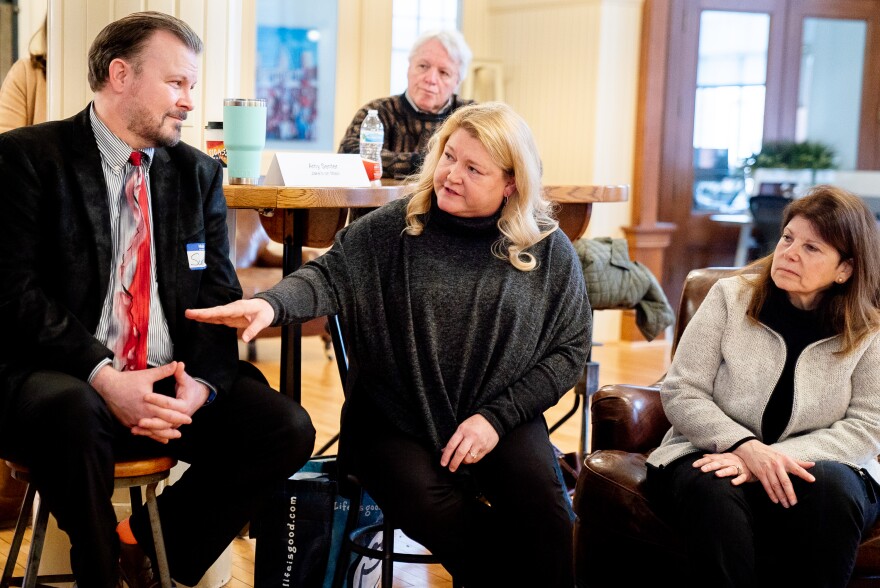Business leaders across the St. Louis area have big goals to reshape the region’s economy by 2030, and some of the core changes prescribed by the 2030 jobs plan are already taking shape.
Tucked away in the plan is a less flashy but equally important goal of reviving neighborhood business districts throughout the metro area.
“This region must grow through small businesses and Main Streets, not only our work and efforts around attracting and developing larger businesses,” said Greater St. Louis Inc. CEO Jason Hall.
To that point, Hall’s organization recently hosted a roundtable discussion with local business owners from St. Charles’ historic downtown, which he said is one of the region’s most successful Main Streets. The goal is to apply what’s working there across similar districts that dot the St. Louis region, he said.
“What’s the formula, what’s the right mix, and you do see that,” Hall said. “You’ve got residential, embedded with small businesses. And even within the small businesses, it’s retailers, restaurants, technology firms, marketing firms.”
Finding a way to replicate that success elsewhere in the metro area is crucial because of the overall hiring small businesses do, he said. They may not have splashy job announcements but collectively create a majority of the employment opportunities across the region.

Creating a community
Over the course of an hour at OPO Startups, a historic post office building that’s been retrofitted as a coworking and office space, small-business owners and the companies and organizations that support them discussed what they see as the keys to the success of St. Charles’ historic downtown.
One theme that emerged early was the idea of creating strong connections between businesses and the surrounding community.
“The biggest thing I’ve learned is when my neighbors do well, I do well also,” said Amy Senter, who owns Jake’s on Main. “I’m far more than just a little T-shirt shop. I share my success with others. I share other people's success on my social media pages, and I promote the area around me.”
Senter emphasized how this helps her business and others combat isolation and work to overcome challenges together. Her store sells Life is Good items and is consistently one of the brand's best-performing retail locations nationwide, she said.
While it's not in downtown St. Charles, Ellen Brazelton also credits the success of her business, a franchise of the Buzzed Bull Creamery, to the business community she was able to build around herself. In the eight months since opening, her store is the second highest earning franchise in the country.
“I got involved with the [St. Charles] chamber very early on,” she said. “I got to meet so many people, really before we were even up and running. Those connections were extremely helpful to me early on.”
Brazelton’s business is in the Streets of St. Charles, a fast-growing development nearby. For Senter, anything that gets more people close to her establishment and others is positive.
“If people come to Streets of St. Charles, they’re going to find out about Main Street, or vice versa,” she said. “It does bode well for us to have more traffic coming into the county or into the city in general.”

A personalized experience
Local business operators also pointed to authentic experiences as key to Main Street's success in St. Charles.
“People want good customer service, they want a personalized experience,” Senter said. “If you can find a way to give that then you’re going to get those repeat customers.”
She said people visit her store just to see her employees or show screenshots of the items they want and ask the store to order them to support the local business. Customers crave quality service, Senter added.
This is something playing out in communities across the country, said Deann Donohue, Mastercard’s vice president of business development for its global cities team. Donohue’s team traversed the country last year speaking to small-business owners, similar to the roundtable in St. Charles, she said.
“Folks want to go, and they want to experience,” Donohue said. “It’s a new term out there called this 15-minute city: ‘I want to have everything in my hands within a 15-minute radius of my house.’”

This doesn’t mean every historic main street or neighborhood business district needs the same look and feel as St. Charles, nor should they, said St. Charles County Executive Steve Ehlmann.
“You can’t replicate this everywhere, but you can replicate something a little smaller and maybe a little bit different,” he said. “From what I heard today, that’s what people are looking for.”
Hall agrees. There’s also new value being placed by consumers on authenticity and shops that don’t exist anywhere else, he said.
“Don’t be parochial. It’s not downtown Belleville versus downtown St. Charles or downtown St. Louis city,” he said. “We need to embrace growth as a region overall, and then there’s more customers for everyone.”
Those involved in the local business community hope more discussions like the one in St. Charles will continue. It’s something Randy Schilling, founder and owner of OPO Startups, the site of the roundtable, sees speeding up growth in other neighborhood business districts.
“When you try to do it by yourself, you just don’t get that acceleration,” he said. “By banding together as a group we can grow a lot faster and grow the region.”
Eric Schmid covers economic development for St. Louis Public Radio.





